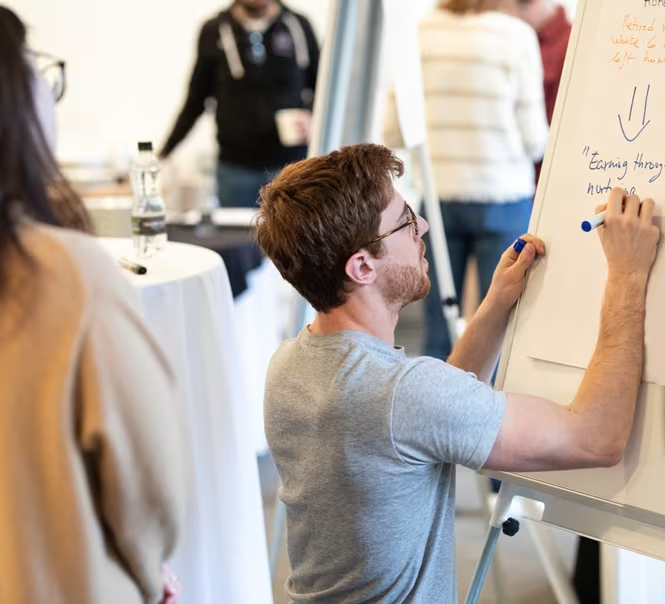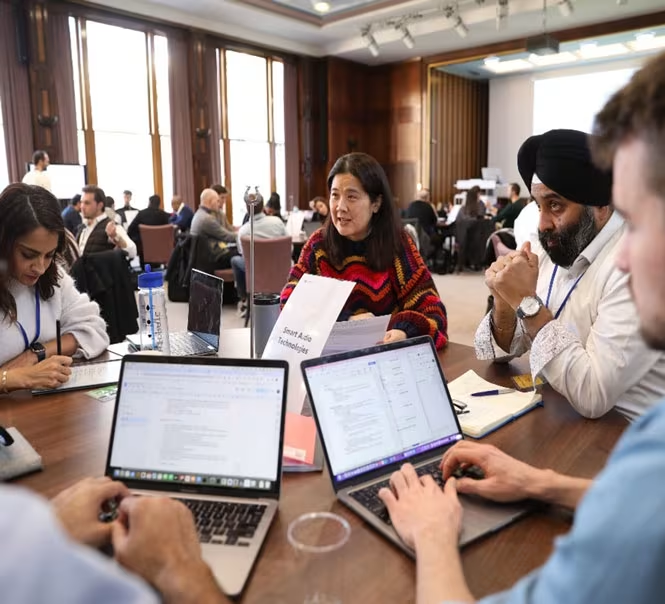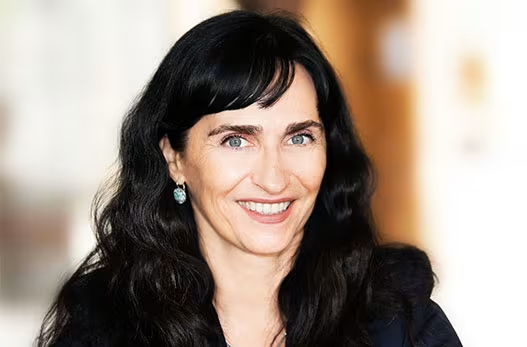Innovation to Market (I2M)

Please enter a keyword and click the arrow to search the site
Or explore one of the areas below
The Innovation to Market (I2M) course is an MBA for-credit elective at London Business School that is open to external applicants, entirely free of charge.
The I2M elective was born out of the realisation that we live in an era where technology-based innovation is more important than ever before and that the most successful businesses will be the ones who are able to bring promising technologies to market ahead of competitors.
Increasingly, LBS students want to join early-stage technology-based businesses and partner with researchers to bring great technologies to market. Likewise, many researchers want to commercialise their research and are looking for partners with the business skills to make this happen.
The I2M course builds well-balanced teams around technologies that are ripe for commercialisation. We bring together researchers and LBS students to form teams that will develop - and maybe even begin to execute on - a lean commercial strategy for an innovative and impactful technology.
Previous cohorts have work on technologies that cover multiple sectors and fields, including healthcare, cleantech, AI, and deeptech broadly. Some of the teams formed during I2M are still working together in the startup they founded.

This experiential LBS elective is for university-based research scientists and LBS students interested in working with early inventions and technologies that are looking to solve a huge problem.
The external researchers will typically be ‘early career’ (late PhD or postdoc) and wondering whether or not to follow an academic career path. They will have developed a technology and have ideas on how it could be used to create social or economic gain and will be ready to invest the necessary time and energy in that process. However, they will realise that they lack the experience and tools to do so themselves and want to gain that expertise. They will also welcome the opportunity to work, as equals, with a team of experienced LBS students to produce a commercial strategy for their technology.
LBS students are all ‘post-experience’, meaning that they have years of experience in a wide swathe of sectors. Many will be hoping to move into leadership roles, for which they will need a solid understanding of how organisations and markets innovate, operate and compete. They are all in their second year of study and want to apply what they’ve learnt about driving technology-based innovation by working on a new technology from the ground up.

During the ‘taught’ element of the course, you will learn a robust methodology for taking a new technology to market. Since virtually all technologies require substantial investment – often over multiple rounds – we will explore technology, market and financial strategies. Participants should commit to attending all these sessions in person and preparing (case and other readings) in advance.
There are three extended taught sessions followed by a major joint project and a final day of presentations. We anticipate that the time commitment for both LBS and external participants will be as follows:
Networking from 12:00-12:45 (Bring your own lunch) and 15:30-16:00. Coffee and tea will be provided.
| January 2025 – March 2025 | Location: London, face-to-face | |
|
Important Dates Three taught sessions run on Thursday afternoons (12:45 to 15:30). Networking from 12:00-12:45 (Bring your own lunch) and 15:30-16:00. Coffee and tea will be provided.
Final presentations/pitch to investors: Friday 14th March from 8h45 to 12h30 |
||
Teaching at LBS is interactive and based on discussion of real cases, from which we construct a general methodology for technology commercialisation. Before each session we distribute a case study that exemplifies the theme of the session. We create mixed study groups to discuss the case beforehand. Each case highlights a major decision point, which acts as a springboard for faculty-led class debate and discussion around an aspect of commercialisation. Often, we invite an experienced guest speaker to share their own reflections on the theme. For these sessions, we have selected case studies that relate to early-stage technology commercialisation. We do not major on any one sector; rather we draw general learnings from the specific cases, developing analytic frameworks and methodologies that can be applied to any ‘ripe’ technology.

Associate Professor of Management Practice in Strategy and Entrepreneurship; Academic Director, Institute of Entrepreneurship and Private Capital
Though this course is a substantial commitment of time, it is an excellent example of getting out what you’re willing to put in.
We do not charge external researchers anything for participation in the course – it is entirely free. However, there are two quid pro quos:
We understand that this level of commitment is substantial. However, for motivated researchers, this time should represent opportunity rather than cost.
Since so much depends on full participation of external participants, each will be asked to sign a binding Memorandum of Commitment with the School and each other prior to final acceptance.
We anticipate that research applicants should:
We fully appreciate sensitivities over the ownership of the intellectual property belonging to the researchers and their institutions. There are, understandably, two main concerns:
The LBS students will act like any other external consultants to whom you might disclose IP and discuss your strategy. At the outset of the course, we will ask LBS students to sign an agreement that preserves your rights. The agreement itself has been specifically commissioned from a leading UK-based IP law firm.
At this point it is assumed that the team members will go their own ways. Should any teams stay wholly or partially intact then they will need to reach a new agreement between them, for which they should solicit their own legal advice.
This arrangement does not obviate the need by researchers to be sensitive to IP disclosure to those not in their team and to external parties (including the judges at the final presentations). You should always operate on a ‘need to know’ basis, ‘black-boxing’ the technology where you can.
Deadline for LBS Students is 30th October 2024
Deadline for external researchers 22nd November 2024
General email: I2M@london.edu
Researchers - apply here
Students - apply here
For any further enquiries, please contact the I2M team via email at I2M@london.edu.